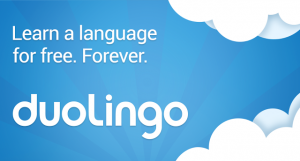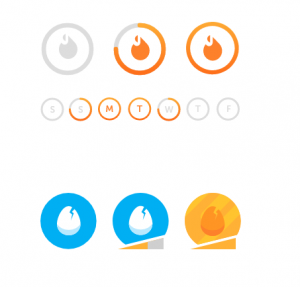Brands that do an exceptionally good job at telling their stories are the stars of our Brand Story Hero series. In this week’s instalment, we are featuring Duolingo, the app that revolutionised language learning.
Brand: Duolingo
Industry: language-learning
Products: language learning app
Founder: Luis von Ahn, Severin Hacker
Year Founded: 2011
Mission: Gamification poured into every lesson.

Founding story
It all started out as an academic project at Carnegie Mellon University, Pennsylvania between Luis and his PhD student Severin. They knew they wanted to work on something related to education and because demand for language learning is huge, they decided to settle on that.
Over 1.2 billion people are currently learning a new language, and 800 million of them are studying English. Their reason is often to either get a job in the first place or a better position within their company. Unfortunately, learning languages costs money and many scholars are short of that.
Luis and Severin set out to revolutionise language education by making it free. Their message was clear: they wanted their product to be accessible to everybody and to be completely free of charge. In 2011, the two designed a private beta version of their language-learning app for which people could sign up. They decided to call it Duolingo, deriving from the Latin words “duo” which means “two” and “lingua”, meaning “tongue” or “language”.
In that same year Luis was invited to give a TED talk where he spoke about massive-scale online collaboration and introduced the idea of Duolingo. Over 1 million people viewed his talk and more than 300,000 signed up for the beta as a result. In 2012, Severin and his mentor launched the app publicly as a free, science-based language education platform and since then, it has grown to be the most popular way to learn languages online. Each month, users complete over 7 billion exercises on Duolingo and the app boasts a total of over 200 million users today.
Duolingo is also the perfect blended learning companion, which is why over 100,00 classrooms are using the app to improve their language skills. Every student takes personalised Duolingo lessons and receives individual feedback and practice. Teachers can track their students’ progress through a dashboard and can design their classes according to how their students are progressing.
In 2014, Luis and Severin launched the Duolingo Test Centre, an in-app language test that came about as a direct response to customer feedback. Contrary to traditional language tests, Duolingo’s version comes at a very little cost with a fee of only $20, the test can be taken on the phone and the testee gets their score back within 48 hours.
Severin and Luis believe that the future of education is mobile, because it is the cheapest way to deliver it to nearly everyone. Their app provides access to a means of education for billions of people and because so many people are using their product, it can be constantly improved. The Duolingo team observes how their users learn and improve their exercises, lessons and courses based on the data they have collected. Their aim is to create the most effective educational system possible and to tailor it perfectly to their students.
There are 42 times as many people learning Irish on Duolingo than there are native speakers of the language.
This St. Paddy's Day, help make it 50 times that and start learning today: https://t.co/ChOPSEwvAe pic.twitter.com/jvw3l5kl89
— Duolingo (@duolingo) March 17, 2018
Storytelling Lessons
#1 Recognise the need
People have been learning languages for centuries, maybe even thousands of years. Nowadays it is particularly important to be proficient in foreign languages, as globalisation continues to make our world smaller and smaller. Up until a few years ago, having limited financial resources would nearly automatically disqualify you from studying languages. All known means of acquiring language skills required money, which many don’t have in abundance. Not knowing any other languages apart from your mother tongue limits job opportunities and income. To break this cycle, Luis and Severin recognised the need for an education revolution. They realised the need for free language education and worked to make it a reality. Now millions of people reap the benefits.

#2 Plan ahead
Luis and Severin have a roadmap for the future. They know what their mission and their vision are and are working towards those. Their mission is to strive to be the best new way to learn a language. Their vision is where they eventually want to end up, which is to give everyone access to a private tutor experience through technology. Only when you have plans for the long run and know where you’re headed, you can check whether you’re still on track or have strayed. Correcting your course of action is then the next step, but it can’t be taken when you don’t know where you went wrong in the first place.
#3 Data can be your friend
Millions of people are using Duolingo every day and create nearly endless amounts of data in consequence. By analysing the exit quotes of their users, Duolingo can assess how successful their current method of teaching is and tweak it in consequence. To further improve the learning experience, Duolingo try out different structures for language courses with different user groups and examine afterwards who learnt better. The course structure of those who did better is then implemented for everyone. Taking advantage of the data created by the language students has proven to be one of the most important and effective development tools for the app.
Just like winter, our High Valyrian course is here and fit for the Mother of Dragons! Start learning: https://t.co/FmYUmXAled pic.twitter.com/8SArZoG8BR
— Duolingo (@duolingo) July 13, 2017
Storytelling Tools
#1 Appoint ambassadors
Duolingo are proud to have ambassadors who help them in their mission of bringing free education to the world. Depending on the interests and areas of expertise of the user, they can be appointed as ambassadors with different functions. Some officiate as course contributors, for example, if they are bilingual, others as event hosts, educators or forum moderators. The ambassadors take a big load off the shoulders of Duolingo’s core team, making their lives a lot easier. At the same time, the ambassadors enjoy certain benefits like an official forum badge, limited edition merchandise, access to community resources or invites to Duolingo events.
#2 Create a manifesto
Duolingo have given their mission and vision some thought and have consequently come up with a manifesto which they have put up on their website. They know that people learn in different ways and they want to create ways of facilitating language-learning suitable for everyone. Making language education available to everyone is what they are ultimately working towards, because they believe in equality. In their manifesto, Duolingo have defined true equality as when spending more can’t buy you a better education. They have laid out their beliefs and goals for anyone to see. That way, visitors can get the measure of Duolingo, its values and goals at first glance.
#3 Make the experience fun
Learning languages with Duolingo is like playing a game. The exercises vary in type, from listening, speaking, translation to multiple-choice exercises. They are all illustrated or animated with Duolingo’s fun and distinctive iconography. To motivate you to stay on track, the so-called streak count takes record of how many days in a row you spend learning the language. To raise the stakes during the lessons itself, Duolingo uses hearts, which you can lose when you answer questions incorrectly and that way they use the natural competitiveness most people possess to their advantage.

All those factors combined make using Duolingo feel more like playing a game than like studying. Normally, staying motivated while learning online is very hard, but because Duolingo is so fun, people prefer it over playing simple games.
Here at All Good Tales, we believe that every brand has a story worth telling. Not yet sure how to tell yours? We’d love to help you out with a free consultation. You can call Gaye on (01) 254 1845 to organise yours today. We also run courses that give you practical information on connecting with customers. For more information or to book your place, click here.
